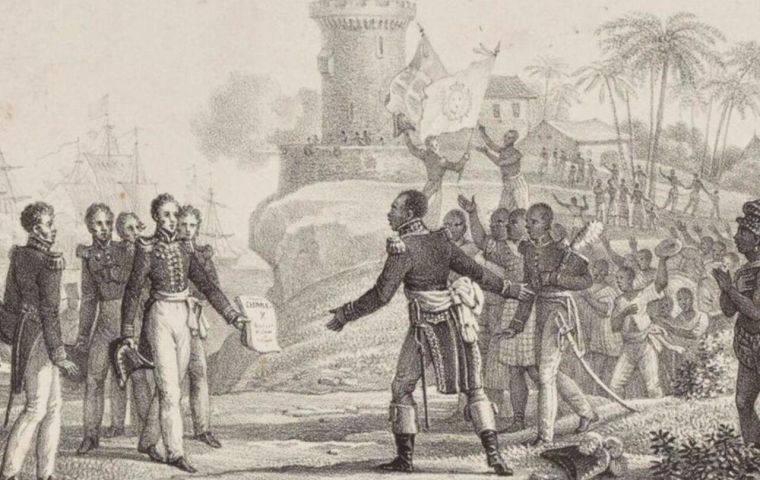MercoPress. South Atlantic News Agency
France demanded to pay slavery reparations to Haiti
 The petitioners also requested that France own up to the independence fee it charged 200 years ago
The petitioners also requested that France own up to the independence fee it charged 200 years ago A large number of Latin American social organizations and personalities, such as Argentine 1980 Nobel Peace Prize laureate Adolfo Pérez Esquivel, demanded Thursday that France recognize and compensate Haiti for the indemnity it imposed after the country's independence in 1804.
France forced Haiti to pay 150 million gold francs to former slaveowners for recognizing its independence, a debt that drained Haiti's resources, hindered development, and contributed to its chronic poverty and instability, it was argued.
The petitioners contend that this “double debt” fueled a cycle of extraction, debt, and foreign interference, exacerbating Haiti's current crisis, described as a “silent genocide” marked by gangsterization and inequality.
In this scenario, French President Emmanuel Macron has announced a joint Franco-Haitian commission to examine the case and propose recommendations for a more peaceful future, though specifics remain unclear.
In France, resolutions in the National Assembly call for recognizing this shared history, with some demanding full reparations and others urging stronger cooperation.
Estimates suggest Haiti’s payments equaled US$ 560 million in modern terms, with broader economic losses potentially reaching US$ 21 billion, contributing to its status as the Americas’ poorest nation.
The organizations said in a statement that “April 17, 2025, will be the 200th anniversary of the order imposed by France for Haiti to pay an indemnity of 150 million gold francs in exchange for the recognition of its independence, after 21 years of blockades and embargoes.” Hence, the Caribbean nation “was forced to pay its colonists and slavers for having dared to become, in 1804, the first free black nation in the modern world and the first free nation in the Western Hemisphere.”
As a result, it was impossible for Haiti to “invest in infrastructure, public services, and industrial development. The wealth of the Haitian people was used to benefit France, contributing to turn it into one of the largest economies in the world.” After draining Haiti's resources, the country was forced to acquire debts “with French, American, and German banks in order to comply with such an unjust agreement.”
Payment of this ”double debt of Independence (...) impoverished the country and its people, and triggered a cycle of extraction, debt and dependence that left it vulnerable to elite domination and foreign interference,“ they explained. This situation contributed to the current context of crisis, which they described as ”silent genocide“, and to the phenomenon of gangsterization in Haiti, which they linked to ”chronic poverty, social inequalities accumulated and reproduced during two centuries of neocolonial asphyxiation.“
The signatory organizations stated that ”Haiti's demands for reparations are therefore situated within the framework of this brutal history of slavery and racism, post-colonial extortion and neocolonial domination by the former slaveholders and their European and US allies.“
”This decision placed a price on the freedom of a young nation, which was confronted with the unjust force of history from the moment it was founded,“ Macron said Thursday. ”Today, on this bicentenary, we must... look history in the face. Haiti was born of a revolution... which boldly affirmed the universal principles of Liberty, Equality, and Fraternity. Haiti's struggle, in harmony with the ideals of the French Revolution, should have offered France and Haiti the opportunity to forge a common path,“ he went on.
”Recognising the truth of history means refusing to forget and erase. For France, it also means assuming its share of the truth in the painful construction of memory for Haiti, which began in 1825,” the President also pointed out.




Top Comments
Disclaimer & comment rules-

Read all commentsWho is responsible for the shithole that Haiti is?
Apr 20th, 2025 - 01:14 am 0The Haitian people.
Outside money hasn't made it better. More won't either.
Commenting for this story is now closed.
If you have a Facebook account, become a fan and comment on our Facebook Page!